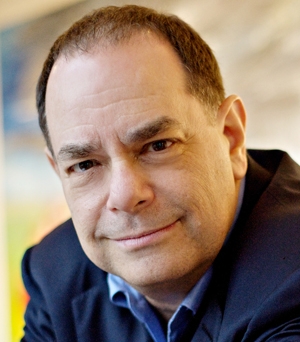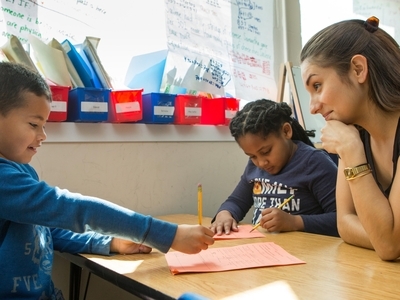Re-Framing Our Young People's Times, Part 1
Topics

Next generation learning is all about everyone in the system—from students through teachers to policymakers—taking charge of their own learning, development, and work. That doesn’t happen by forcing change through mandates and compliance. It happens by creating the environment and the equity of opportunity for everyone in the system to do their best possible work.
EMPOWERED! Chapter 3
How can we most usefully transition from the last pre-internet generation the world will ever know, to the world’s first internet generation?
Note: This article is a reprint of the first half of “Chapter 3: Re-Framing Our Young People’s Times” from the author’s book, EMPOWERED! Re-framing ‘Growing Up’ for a New Age. Read Chapter 1 and Chapter 2.
Let’s start by thinking about ways to re-frame the time period (or “Age”) our young people are currently entering into and will be fully part of in 20 years: the mid-to-late 21st century. To begin, we might ask “What’s different?” For me, one of the most important differences is worldwide connection of young people starting at a very young age.
We are currently in the process of transitioning…
From the Last Pre-Internet Generation the world will ever know,
To the world’s first Internet Generation.
That change, along with all the other technological changes that have accompanied it, right around the year 2000, has huge implications for our young people.
So how can we most usefully frame their time?
Re-Naming
Sometimes useful re-framing can come purely through re-naming—as with “Digital Natives.” Several names have already suggested to re-frame the new period into which our children are quickly moving.
Some call the New Age “The Fourth Industrial Revolution”—employing a business evolution frame. Others—employing a major influence frame—call it “The Anthropocene,” meaning The Age of Human Domination. Some—using a frame of technological risk and disruption—are working to frame it as a time that is more Human-Centric than machine-centric. Still others—framing the times around exponentially advancing technology—call it an “Age of Abundance.” I’m sure there are more.
Trying on each of these frames and seeing the world through each of their different lenses is a useful exercise that I recommend doing. In the end, after trying them all, we will each choose the frame that is most helpful and useful to us.
My Preferred Re-Frame
But if helpfulness and usefulness are indeed the criteria for choosing a frame, it seems to me that framing our times around human domination, or business, or even technology alone, is not the most useful way to go. Rather, the overall frame I find most helpful for our coming times, and that I suggest we use, is one of increasing empowerment—especially empowerment of our young people. That frame is positive for all—for humans, for business, for technology, and for all of society—particularly if the new power is used in positive ways. Empowering our young people will, of course, eventually empower all humans.
And the all is important—it is not helpful to leave some people out. I believe the relationship of all young people to the world is about to change in these new times. Here is the 21st-century frame I find most helpful.
We are moving:
From a time where young people had little or no power,
To a time when young humans have far more power to accomplish in the world than they ever had before in history.
Name That Frame
Because a new frame requires a way to call it and refer to it, I call this fast-arriving time:
The New Age of Empowerment
for people growing up.
The New Age begins with the empowerment of those people who happen to be—and I would say are lucky to be—young at the start of the second millennium. As we will see in detail in the next chapter, they are all now becoming Symbiotically Empowered Humans.
A New Frontier
I often ask people I meet, both young and old, if they are afraid of the future, and a great many say yes. “Fear is the dominant emotion of our time,” says business consultant John Hagel.
One reason people are afraid is that the New Age of Empowerment is, metaphorically, a new frontier for humanity. I explore this “frontier” metaphor further in Chapter 5. But let me note for now that whenever any new frontier opens, it is normal for many people to fear going there. Despite humans’ so-called “spirit of exploration” or “adventure,” I believe most humans crave comfort above all else (beyond just staying alive). A new frontier is not, typically, comfortable.
So, a great many of today’s adults are already uncomfortable in, and afraid of, entering this new world we are approaching—and are particularly fearful of sending their children into it. Adults, after all, are tasked with protecting their young from harm.
Most adults don’t go any farther into the new frontier than they have to, and they often try hard to keep their children out of it—for example by not letting their children get connected online at young ages, or by limiting the time their children spend with their devices, or by taking away those devices at bedtimes or at classroom doors. Many adults think that by controlling their children’s behaviors they are “protecting” the children—whom they know have already, in most cases, crossed the frontier.
Afraid? Or Excited!
But how useful is it to our young people for adults to frame the coming age as a time to be feared? Of course there are many unknowns. And there are, clearly, some potential big issues—including the possibilities of our planet’s climate no longer supporting humans, and of nuclear self-annihilation of our species. But I am enough of an optimist to think those dangers will be overcome.
My strong sense is that fear is an inappropriate frame for our young people’s future. I think it will be far more useful and helpful to young people to re-frame their future, far more positively and hopefully, in terms of empowerment. I think we can relax—and rejoice in the fact that our newly-empowered young people will find the means to deal with their fast-changing environment and rapidly approaching crises.
Further, I strongly believe it is unnecessary to protect young people from the new frontier—despite potential danger—because being there is how they learn to adjust and cope. Plus, it is often, for them—in some cases because of the possible danger—an exciting place to be. Any harm will come, I believe, from preventing our young people from going in as deeply as they want to, even at early ages. Even though keeping their own, or others’ children out may, in fact, give adults some short-term comfort, I believe we will all be better off if adults empower young people as much and as quickly as possible.
Read More: EMPOWERED!
- Chapter 1: Re-Framing Growing Up for a New Generation, Part 1 and Part 2
- Chapter 2: A New Generation Seeing Things in a New Way, Part 1 and Part 2
- Chapter 3: Re-Framing Our Young People's Times, Part 2
- Chapter 4: Re-Framing Who Young People Are, Part 1 and Part 2
- Chapter 5: Re-Framing Where Young People Will Live, Part 1 and Part 2
- Chapter 6: Re-Framing What Young People Believe, Part 1 and Part 2
The full book is available on Amazon.
Photo at top by Ali Pazani.




